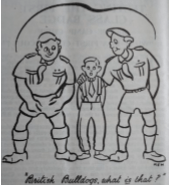Cambridge District Scout Archives
British Bulldog is a game is characterised by its physicality and is often regarded as violent.
Commonly one or two players are selected to be the bulldogs and stand in the middle of the play area. All remaining players stand at one end of the area and run from one end of the field of play to the other, attemting to avoid capture. To capture someone, the bulldog must lift the player completely off the ground long enough to yell, ‘British Bulldog! 1, 2, 3’ When caught they become a bulldog themselves. The winner is the last player or players ‘free’.
During WW2 the potential to damage clothing generated a strong objection to the game within Troops.

After the Second World War ‘The Scouter’ published a number of gentle challenges to the game:
1946 ‘I have a fairly low opinion of it (British Bulldog) – it requires no skill and little intelligence’
Questioning why ‘it must be played whatever else is omitted from the programme’.

Whilst Senior Scouts had been introduced at this time most Troops were either mixed Scout and Senior Scout patrols or did not have separate Senior Scouts. The age range in a troop was 10½ to 18. and on one occasion the need for the Troop Leader to support the ineffective attempts of a smaller Scout to capture anyone at all was recorded.
Banned from many places due to injuries the game or the name changed. The game was changed to reduce the injuries, or the name was changed to (temporarily) confound the authorities. Gentler variations under the same name are played today.
Cambridge Archives
1925 ‘I always remember him (T M Cherry ADC) for the fact that he would visit our troop about every six weeks or so and always suggested we should have a few quiet games, this meant “British Bulldog”.’ Ken North ‘70 years’
1934 – 1939 In the 56th Cambridge, later the 1st Harston, log book that covered all meetings, if not every one in full, there is only one mention of British Bulldog. Many other games are mentioned, some of these having an explanation suggesting they were new.
1939 ‘A brisk game of British Bulldog made us look like a bit of rag.’ 13th Cambridge
‘British Bulldog two rounds, one for the younger brethren, then the large’
Twice during this period a broken window is recorded as the result of BB. ‘A window got broken and one or two fellows were bruised but otherwise the game went over well’.
1941 /42 Revisiting the troop when on leave the first correspondent is certainly under 30 the second probably so. ‘And still they prefer British Bulldog. I didn’t join in – I am too old now!! ‘ ‘Like Walter I too, felt unequal to joining in the thrill of British Bulldog!! There was only one casualty that night.’ From Evercircular Letters
1942 The 7th Cambridge recorded the variants ‘Hopping Bulldog’ and ‘Piggyback Bulldog’. It is not clear how the second variation worked. For a period it was recorded most weeks.
1944/5 ‘ A rousing game of British Bulldog took place. After everyone had fitted their arms and legs back in their sockets we had refreshments.’ 13th Cambridge log.
1950 A Scout of the 7th, never hitherto caught in the act of smoking, was exposed when a full packet fell from his pocket during a game of British Bulldog.
1952 44th Cambridge (Trumpington) ‘ and that old favourite British Bulldog.’ The CoH had decided that no game should not be repeated two weeks in a row. The troop was split in two by size for two rounds of this game.

1962 The 7th Cambridge (County School) were playing British Bulldog in some form around this time. It is recorded in the Patrol log that ‘Kedge fell and broke his arm’ – this, however, was during rope whirling.
1972 ‘Some games (Bulldog) were dangerous for cubs.’ This observation in the District Minutes was to be brought to the attention of Cub Leaders.
JWR Archivist Feb 2019